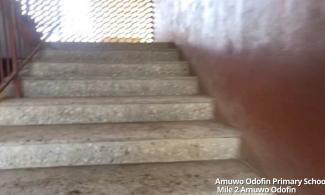
Unfortunately, investigation by Sahara Reporters revealed that many of the inclusive school are not only physically inaccessible for the pupils but are also unknown to Lagos State residents.
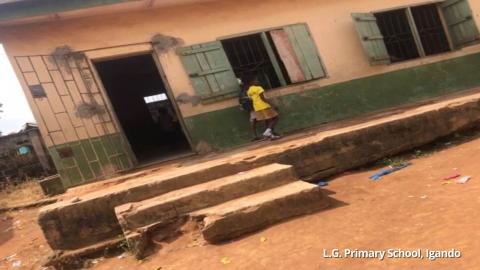
“Having an inclusive school is a welcome development but what is the value of an inclusive school that is not accessible to the students?”
This was the curious question of Oluwakemi Odusanya, a visually impaired On Air Personality (OAP) at Unilag FM, who spoke with SaharaReporters at Pacelli School of the Blind and Partial Sight’s old students meetup.
Lagos State, with 31 inclusive units spread across primary schools in all its 20 Local Government Areas (LGAs), is one of the four states in Nigeria that have introduced a semblance inclusive learning to cater for children with different disabilities, according to Rasak Adekoya, Public Awareness and Communications Manager, USAID SACE Project. Although, some of the special education experts who spoke with Sahara Reporters argued that the state is yet to achieve true inclusive education, rather what it has done is mainstreaming of special education.
Inclusive education is a system that allows all children regardless of their peculiar challenges to learn together in the same classroom but with special support to cater for their specific needs within the same space. Mainstreaming, on the other hand, is a system where special schools are situated within the same premises of the regular schools.
However, regardless of the disagreement on the classification of the schools, accessibility is at the center of educating children with disability. Unfortunately, investigation by Sahara Reporters revealed that many of the inclusive school are not only physically inaccessible for the pupils but are also unknown to Lagos State residents.
The old building that houses classrooms of the inclusive unit at the Local Government Primary School at Church bus-stop in Igando, is a potential hazard to many of the physically challenged pupils in the school. Entrance to the classrooms has elevated platforms with multiple potholes, and steps that make mobility on wheelchair almost impossible.
It is the same condition in almost all the twenty-one schools with inclusive units visited by Saharareporters. The stairways have no ramp, neither are there facilities for the hearing impaired to be notified during general activities like the morning devotion and break time. At the inclusive unit of Maryland Primary school, SaharaReporters observed as the class teacher in one of the classes for the hearing impaired pupils had to call the attention of the pupils for them to know it was lunch break.
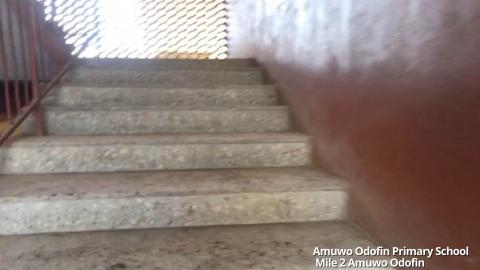
Locating these schools is also a herculean task for residents as there is little information about the schools on the Lagos State website neither are the officials in some Local government secretariats aware of the inclusive units within their Local Government Areas (LGAs). In one of the newsletters on the Lagos State website, the number of inclusive units across the state was stated but there was no further information about the specific schools with inclusive units out of the 1,010 schools in the state.
Sahara Reporters was at the education department of Ikeja Local Government Council at Obafemi Awolowo road, as a parent seeking information on how to enroll her child in the inclusive unit within Ikeja LGA but the officials had no information.
“I don’t know any school with inclusive units in the Local Government. Go to Ministry of Education at Alausa to find out” a dark plump lady who was seated at the education secretary’s office said. It was the same scenario at the Yaba Local Council Development Area (LCDA). The lady at the education department simply said she is only aware of Modupe Cole Memorial Child Care and Treatment Home School.
At the Basic Education Service Department in the Ministry of Education, the elderly woman who attended to this reporter gave no information. She simply picked a piece of paper, jotted the address of the child care department in Akoka and handed the piece of paper to the reporter without as much as uttering a word or even acknowledging her greetings.
The Lagos State Universal Basic Education Board (SUBEB) only made the list available to SaharaReporters following a Freedom of Information (FoI) request.
Deaf School with No Sign Book
Investigation revealed that there are no government provided sign language books for the hearing impaired pupils at Wesley School for the Deaf. One of the teachers in the school who spoke with SaharaReporters on condition of anonymity said the government has no sign book for the students.
“It’s hard for the children to fully learn their own language because there are no adequate materials to really teach. The government does not even make provision for them. Some of them come to school, sit down and leave when it’s closing time without learning any tangible thing.
“Except few of them whose parents can afford to buy either the local or international sign language textbooks for, they rely on what the teachers teach them in learning the sign language. The Lagos State Government does not have a sign language textbook for the students,” he said.
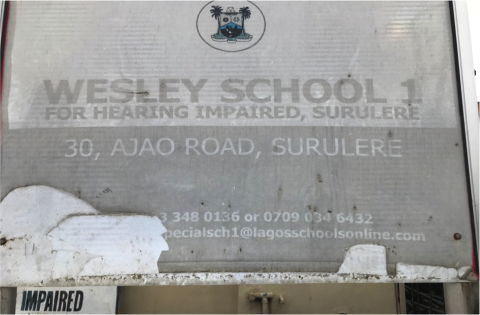
This was confirmed when SaharaReporters visited the school. In the basic four, only one of the twenty pupils has a sign language textbook, The Joy of Signing, which he provided by himself. The Lagos State Government gives the same textbooks it provides for those in the regular schools. While this is a not absolutely wrong, hearing impaired children who are not adequately grounded with the sign language, would find interpreting printed letters difficult.
The President of the National Handicap Carers Association of Nigeria, Adewale Adeyanju, also told SaharaReporters that there is no locally produced sign language book in Lagos State.
“LASG doesn't have sign language books. LASG just recently started to experiment with production of sign language pamphlets,” he said.
“Sign language is very key for the deaf,” Shehu Adebayo, a Disability and Development Consultant, told SaharaReporters in an interview, “because that is the language they can speak and that is also the way they communicate with the outside world. If there is a challenge in learning this language, that child is going to have problem.
“We expect that the priority of the education of the deaf child should start with the learning of the sign language because it is only when they learn the sign language that they can interpret the alphabet and the words and numbers. That is when they can grow their numeric and literacy skills. So, they need to know all of these things and whatever learning materials that are being used should follow the line of proper professional guidelines of their curriculum.”
One Type Fits All Curriculum
16 year old Dada Joshua (not real name) has been in a class for six years at Modupe Cole. His teacher Mr. Adeife, said he will be promoted only when he has learnt and retained enough information to proceed to the next class. Joshua, who is educable though intellectually challenged, is subjected to the same curriculum and learning materials as the regular students in normal schools.
Mr. Adeife explained that the school receives free books from the Lagos State government but the books are not adapted for the special needs pupils admitted into the school. “You have to repeat a lesson multiple times before the pupils get it. If you teach once, they forget,” Mr. Adeife said, justifying the need for the pupils to have material adapted for their mental capacity. He said, though with caution not to indict the government, that effort to ensure the government design appropriate materials and curriculum for the pupils has been unsuccessful.
The pupils with different disability who are put together in the same classrooms, in all the inclusive units also use the same textbooks and are expected to learn at the same pace. Adebayo opined that it is impracticable to put children with different disabilities together without providing adequate manpower to cater for their individual educational needs. Explaining the downside of having children with intellectual disability together in the same classroom with children with other forms of disability— as it is in the 21 inclusive schools visited by Sahara Reporters— Adebayo stated that; “intellectual and developmental disability have various subs (sic) under it; there are those with autism, down syndrome, dyslexia, cerebral palsy etc.
“All of these come with different learning challenges that may present some difficulties if trying to introduce them into mainstreaming or other level of inclusion without having the requisite manpower and equipments because their pace of learning is completely slowed down and they cannot be taught at the same pace with other nonintellectual disabled children,” he added.
This is however the reality in all the Lagos State inclusive units; the pupils are put together in the same classroom with a teacher assigned them.
Mr. Abdulsalam—the teacher, driver and cleaner
Lack of resource persons is one of the inadequacies of Lagos State inclusive and special schools. In some of the schools visited, the unit has only one teacher assigned to all the children with different disabilities that ranged from hearing impairment, to intellectually challenge.
Mr. Abdulsalam, a tall, slim, bearded man, is the resource person in charge of the inclusive unit at the Roman Catholic Mission (RCM) School, in Okunraye, Ibeju Lekki. On Monday, September 19 2018, when SaharaReporters was at the school as a parent seeking to enroll her visually impaired child, Mr. Abdusalam was preparing to drive the children to their houses.
“That is how he does it” a teacher in the school said “he is the only person in the inclusive unit. He is the teacher, the driver and also the care giver. If some of the children who cannot clean for themselves poop, he is the one to clean them up. He does everything for the pupils.”
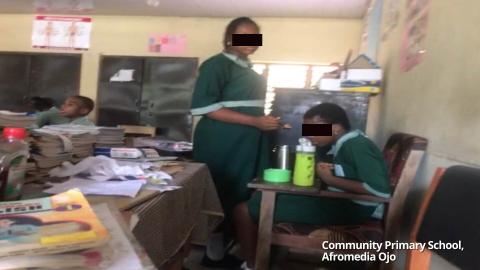
Mr. Abdulsalam is not the only special education teacher who takes up other care giving responsibilities. At Amosun Primary School, Agege, the inclusive unit has one teacher who specializes in hearing impairment. In her class, she has pupils with Down syndrome and cerebral palsy. These set of pupils should have specialists who can handle their peculiarities.
Also, at Central Primary School in Festac, there are two teachers assigned to take care of over thirty pupils with different disabilities. At Bola Memorial Anglican Primary School, Bank Anthony Way, there is only a teacher who will be retiring in February of 2019.
Lack of sufficient resource person is not only peculiar to the inclusive units; the special schools also grapple with the same challenge. At the Stimulation Class in Modupe Cole, two teachers cater for over 30 students. Mrs. Nzeh Mabel, a teacher at Wesley School, also complained about inadequate specialized and qualified teachers.
Mr. Adebayo stated that the lack of manpower is one of the impediments to achieving inclusive education.
Lagos State Is Breaking Its Law
The Lagos State Special People’s Law (2010) was passed by the Lagos State House of Assemble and assented to by Babatunde Fashola, a former governor of Lagos State, to protect the rights of people living with disability in the state. The law enshrined in it the right of children with disabilities and the roles of the government in protecting these rights.
Section 29 of the law mandates the government to make public facilities accessible for special people.
Sub-section (1) says: “ A person living with disability shall have the right and necessary facilities to access public buildings and public places.
“(2) A public building shall not be constructed without the necessary accessibility aids such as lift (where necessary), ramps and others that shall make them accessible and usable to persons living with disability.
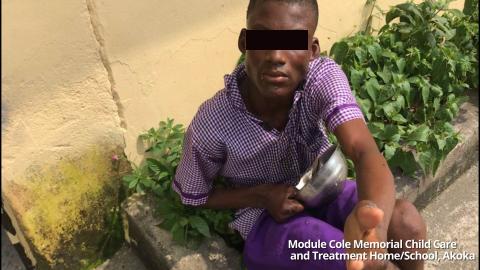
“(3) A Landlord or Landlady shall allow a person living with disability lawfully occupying the property as a tenant to make such access related modifications to the building as would allow him or her access his or her apartment provided he or she shall remove such modifications before vacating the premises.
“(4) The Government shall ensure that roads, side-works, pedestrian crossings and all other facilities made for public use shall be made accessible to and usable by persons living with disability including those on wheelchairs.
“(5) There shall be a transitory period of five (5) years within which all public buildings, roads, pedestrian crossings and all other structures shall be modified to be accessible to and usable by persons living with disability.”
Contrary to this provision, not only are some of the inclusive units in the much newer buildings not accessible, in violation of section 29 (2) and (4), the inclusive schools in old structures have also not been modified as mandated by section 29 (5).
Inibehe Effiong, a human rights lawyer, also said that the state government is violating Section 33 (7) and (8), with the failure to provide appropriate curriculum and learning materials for children with disability in its schools.
Sub-section 7 says: “the curriculum of every primary, secondary and tertiary school shall include— (a) learning of Braille; (b) sign language; (c) augmentative and alternative communication skills; (d) peer support and; (e) mentoring.
“(8) Government shall ensure that the education of persons living with disability, particularly children who are blind, deaf or with multiple disabilities, is delivered in the most appropriate languages, modes and means of communication for the individual, and in environments which maximizes academic and social development.”
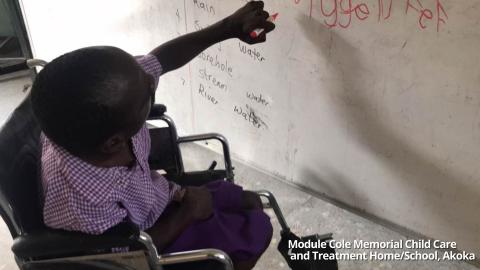
No Respite in Sight
Six months ago, before the political impasse in the ruling All Progressives Party (APC), the Lagos state government announced that it would recruit 1000 teachers to fill in the vacancies across primary schools—including inclusive schools— in the state.
The announcement was made by the Deputy Governor of the state, Mrs. Idayat Adebule, who is also the state’s Commissioner for Education, at a seminar organized by Teachers’ Establishment and Pensions Office (TEPO).
This much needed intervention has been shelved following the political tussle that crippled the second term chances of Akinwunmi Ambode led Lagos State Government, an anonymous source close to the current state governor told SaharaReporters.
“Every government ministry is in limbo now; nobody is paying attention of any defect anywhere anymore” the source said, “the boards of all agencies and parastatals are struggling to curry favor with the next administration as it is clear the current governor is not coming back.”
This was also corroborated by another source in SUBEB who declined to be named because she has no authority to address the press on the issue but conversant with the issue. Speaking with SaharaReporters, she said the board is aware of the challenges in the schools, not just the inclusive schools, but there is no political will to address any of them just yet.
“We already set recruitment in motion; the inclusive schools were going to get personnel from the 1000 teachers that the government wanted to recruit months ago. But at it stands, the process has been stopped. We can only hope the new board that will be favored by whoever becomes the next governor, pay attention to inclusive education.
“Board appointment is earned by loyalty to wherever becomes the governor, I am sure most of the current board members will not be reappointed, which also means the focus might change.”
All effort to get an official response from the board was unsuccessful.
How Inclusive Schools Can Work
The President of the National Handicap Carers Association of Nigeria opined that inclusive education is a great initiative but it can only work if the special pupils are provided appropriate learning aids and personnel they need to thrive.
“Inclusive Schools though are good,” Adeyanju said, “but it has its shortcoming. When in a classroom set up, only one teacher is available who cannot sign all through the lesson but talking and expecting the Deaf students to grasp what he’s talking, it will lead to disadvantage for the deafstudents concerned.
He explained further that science courses are difficult to teach in a class where there is no dedicated teacher for the hearing impaired pupils.
“If you want to sign Tetraoxo permanganate, nitrate acid forexample, you have to finger spelled the words. It can be strenuous forteacher to teach both the hearing and the deaf together because hewill soon find that the hearing grasp the knowledge faster while hehas to be slowed for deaf to catch up.
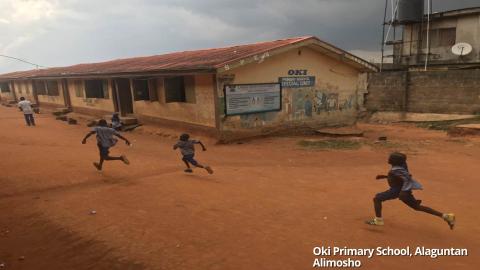
“If Inclusive school setting must work, special students must be ableto have plenty education aid materials including books, laptop,computer PCs and others needs. If a teacher is compelled to teach onregular basis without adequate remuneration, they (teachers) will get bored and may opt out to seek for a greener pasture. Thisis why there are few serious teachers for the deaf in Nigeria. The remuneration is too low.
“The solution to the challenges lies in the change of attitude and mindset of our leaders and the society at large so that priority will be given to special education. If they truly desireeducation for the deaf, we need huge investment in education; trainingof many teachers to use sign language, books and education aids mustbe supply in large quantity and wages paid as at when due plus otheremoluments and benefits.”
Our Monitoring and Evaluation Team will Swing to action—LASODA
The Lagos State Office for Disability Affairs (LASODA), a state agency empowered by the Special People’s Law to collaborate with state agencies to ensure that their facilities and operations accommodate pople with disabilities, expressed surprise at the anomalies found in some of the inclusive schools.
Mr. Ademuluyi Adebowale, the Public Relations Officer (PRO) of the agency lauded the effort of the state government in ensuring children with disability get quality education but promised to investigate the state of the schools and make recommendations to the appropriate agency.
He, however, agreed that physical accessibility should have been a paramount consideration for the government when setting up the inclusive units.
He said: “Even where there are no accessibility in such school before but by the time they have it as an inclusive school, they ought to give accessibility major consideration.
“This is an information to me, we cannot claim to know it all and we cannot claim to have done the best of everything but it is a continuous process. I have heard this as a feedback… we will of course, do something about it.”
He further explained that is it not the responsibility of LASODA to run the school but to ensure that they are not just accessible to the target audience but also useful.
“I can assure you that our monitoring and evaluation team will see to it” he said.
For the record: List of Inclusive Schools In Lagos State
LIST OF NAME OF 31 INCLUSIVE UNITS (PRIMARY), LGEA AND THEIR LOCATION
| S/N | SCHOOL/UNIT | LGEA | LOCATION |
| 1 | Amosun Primary School, Agege | Agege | Dairy Farm Complex, Near District 1, Agege |
| 2 | Ore Ofe Primary School, Dopemu | Agege | 86, Abeokuta Express Way, Dopemu, Agege |
| 3 | L.G. Primary School, Igando | Alimosho | Ikotun Rd, Church Bus Stop, Igando |
| 4 | Oki Primary School, Alaguntan | Alimosho | 1, TenibegilojuStr, Off Ikotun Rd, Alaguntan |
| 5 | All Saints Primary School, Iju Road | Ifako Ijaiye | Agege Pen Cinema Bus Stop, Iju Garage, Iju Road |
| 6 | New Oko Oba Primary School | Ifako Ijaiye | AkinsegunStr, Off Charity Rd, New Oko Oba |
| 7 | G.R.A Primary School, Ogudu, Ojota | Kosofe | Emmanuel Str, Off Ogudu, Ojota |
| 8 | Maryland Primary School, Maryland | Kosofe | Maryland Schools Complex, Maryland |
| 9 | L.G. Primary School, Ipakodo | Ikorodu | Adeyemo Close, Ipakodo, Ikorodu |
| 10 | Army Children Primary School | Eti Osa | Bonny Camp Cantonment, Victoria Island |
| 11 | Ado Primary School | Eti Osa | Ado Langbasa Rd, via Ado Roundabout, Ajah |
| 12 | Ereko Methodist Primary School | Lagos Island | 35, Beckley Street, Off King George Rd, Lagos Island |
| 13 | St. Joseph Primary School, Elegbata | Lagos Island | 16, Cole Street, Elegbata, Apongbon, Lagos |
| 14 |
R.C.M Primary School, Okunraye |
Ibeju Lekki | Okunraye Town, Ibeju Lekki |
| 15 | R.C.M Primary School, Ayeteju | Ibeju Lekki | Ayeteju Town, Ibeju Lekki |
| 16 |
A.U.D Primary School, Epe
|
Epe | Alawaye Street, Epe |
| 17 | Methodist Primary School, Agbowa | Epe | Local Govt. Education Authority, Epe |
| 18 | Methodist Primary School, Apapa | Apapa | 32/34 Randle Road, LGEA Compound, Apapa |
| 19 |
Sari Iganmu Primary School, Apapa |
Apapa | 4, AdekunleDeen, Sari Iganmu, Orile |
| 20 | Anglican Primary School, Araromi | Ajeromi Ifelodun | 11, Yaya Crescent, Ajegunle |
| 21 |
AmuwoOdofin Primary School, Mile 2 |
Amuwo Odofin | Mile 2 Housing Estate |
| 22 | Central Primary School, Festac | Amuwo Odofin | 5th Avenue, Festac |
| 23 | Aganju Aka Primary School II, Ojo | Ojo | Along Kemberi, Abule Aka Rd, Okokomaiko |
| 24 | Community Primary School, Afromedia | Ojo | Afromedia Ajangbadi, Ojo |
| 25 |
Muslim Primary School, Badagry |
Badagry | Along Kemberi, Abule Aka rd, Okokomaiko |
| 26 | L.A Primary School, Badagry | Badagry | Ajara Road, Badagry |
| 27 | Bola Memorial Primary School, Ikeja | Ikeja | Abule Nla Bus stop, before EKO Hospital |
| 28 | Estate Primary School, Ogba | Ikeja | Opposite Oluwole Estate, Ogba |
| 29 |
Ojuwoye Comm. Primary School |
Mushin | 35, Damengoro Street, Mushin |
| 30 | Olisa Primary School, Mushin | Mushin | Dada Olisa Street, Papa Ajao, Mushin |
| 31 | Central Primary School, Oshodi | Oshodi Isolo | Beside Council Secretariat, Oyetuga, Oshodi |
This report was supported by Wole Soyinka Centre for Investigative Journalism (WSCIJ) Regulators Monitoring Programme (REMOP) for the Education Sector.